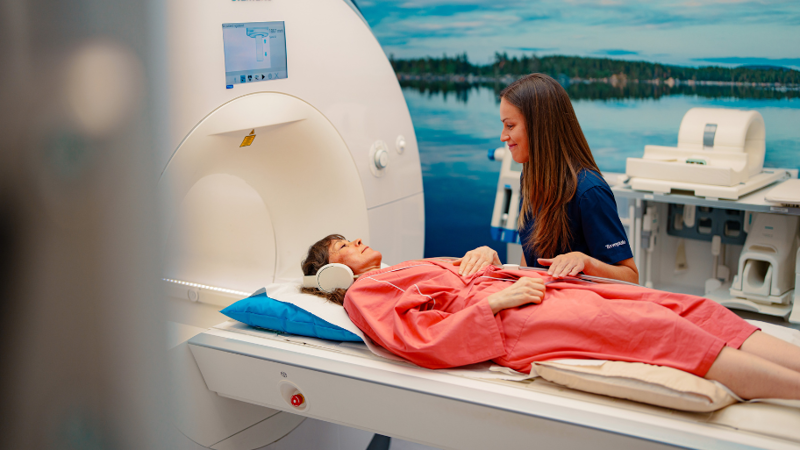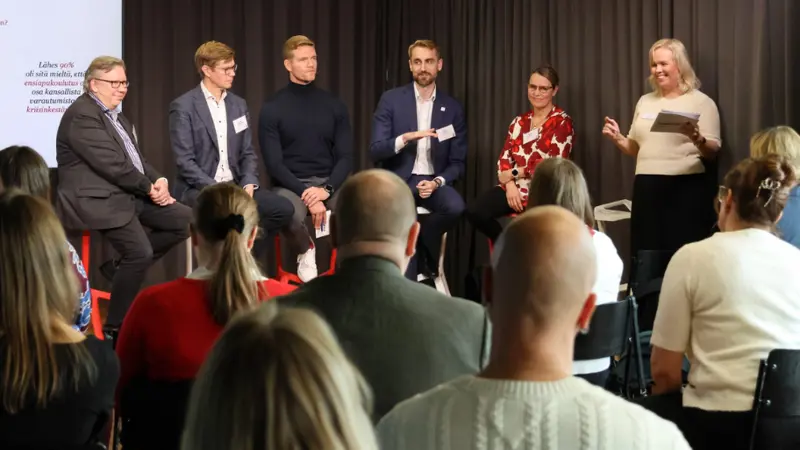AI in the future of working life
Generative AI, such as Chat GPT, has brought AI into a new light recently. In particular, its impact on working life has been a topic of discussion in Finland and around the world over the past year. Ilari Richardt, Director of Digital Services at Terveystalo, shared his views on the opportunities AI brings at Terveystalo's event "Tulevaisuuden työelämän tekijät".

Generative AI, which is the current state of the art, started in 2017 with a research paper published by Google. At the time of publication, it did not attract much attention, although a team of researchers had discovered a new and revolutionary way to store data. This new way of storing data virtually enabled the emergence of generative AI models. Today's models - such as GhatGPT - not only store words, but understand the context of the words and learn from it. For each word, the AI model is trained by asking three questions: why is this word here, what other words are related to this word, and how are they related.
– Thanks to the new storage method, today's AI models learn the context and can interact with us in a very understandable way, even if they don't understand things on a human level, says Richardt.
AI is not limited to a single domain, but has a wide range of applications. Goldman Sachs has estimated that up to 60% of professions will be transformed by AI. So AI is entering the world of work in a big way, and its impact could be revolutionary.
– In Finland, too, every company must now consider how AI can be used in its own business. The change is already underway, and AI will inevitably affect every organisation's personnel, the nature of work, career paths and competitiveness, among other things, says Richardt.
Many companies put the brakes on in exploring AI because they see the new technology as an expensive investment. Instead of building your own AI solution, Richardt recommends exploring different AI solutions with the help of technology providers, which makes them reasonably affordable.
– Several models can be augmented with the organisation's own data and ensure that the underlying AI data only contains data that is approved by the organisation. This allows everyone to get started in a lightweight way, confident that the AI will work according to the principles of the organisation.
Three ways to harness AI to work for you
1) AI as a content provider
Various AI applications offer assistance in content production. In addition to high-quality text, they can also be used to create images, videos, audio - practically anything. But you need to know how to talk to AI to get a satisfactory result. The use of AI may create new roles for organisations: there is a need for people who can interact with AI models and train them to produce content that meets the needs of the organisation.
2) AI as a sales assistant
It is already possible to harness AI as an assistant in sales negotiations. When two companies are negotiating a future partnership, the conversation can be recorded via microphone and the AI can be tasked with drafting a written contract proposal based on the conversation at the end of the negotiation.
3) AI as a data interpreter
AI can clarify complex information and crystallise it into a comprehensible form, which naturally improves the flow and efficiency of work. In many organisations, for example, there are a lot of employee manuals and not many people know every exception by heart. Instead of using open data, an AI assistant can be provided with the entire organisation's HR guidelines to internalise, and then be asked for instructions on what to do in specific situations. The AI assistant is able to retrieve the answer from the correct instruction, combine interpretations of different instructions and tell the inquirer what is the agreed way of doing things in the organisation.
Read more occupational health articles

Terveystalo's digital services have been awarded the internationally recognized ISO27001 information security certification.
Terveystalo's information security practices, processes, and risk management are in line with international best practices.

Does massage help relieve stress? – Touch restores and calms the body and mind
Stress is not always visible on the outside, but the body does show signs when the strain increases. According to Lassi Ylönen, a trained massage therapist at Terveystalo Rela, the body often communicates stress through subtle signs.

Circular economy and artificial intelligence boost performance and improve care
At the heart of sustainable healthcare, technology serves as a tool for improving both the quality of care and accountability. Terveystalo favors solutions that combine sustainability, cost-effectiveness, and medical expertise.

Psychologist: How to make Christmas a relaxed and personal celebration
For many, the anticipation of Christmas begins when cities are decked out in seasonal lights and the first chocolates, calendars, and gingerbread cookies appear on store shelves. Christmas carols ring out and the Tonttuparaati choir sings “Kiire jo on! Kiire jo on!” (Hurry up! Hurry up!). This warm and atmospheric celebration also brings other feelings to mind: how on earth can we get through all this without losing our joy and peace in the rush?

Terveystalo and Gosta Labs deepen their cooperation: the goal is to streamline work with a superior patient information system
Terveystalo is deepening its cooperation with Finnish health technology company Gosta Labs and investing €1 million in the company as a minority investor. The aim is to jointly develop artificial intelligence solutions that improve the quality of care and the efficiency of reception work as part of Terveystalo's new patient information system, Terveystalo Ella.

First aid preparedness in companies requires action and courage
First aid skills increase resilience, but a barometer survey of Finnish organizations' first aid capabilities published in October reveals that the number of trained personnel is alarmingly low.